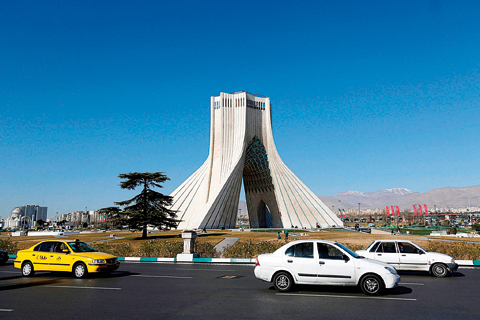 TEHRAN: Iranian motorists drive past the Azadi Tower in the capital Tehran yesterday. —AFP
TEHRAN: Iranian motorists drive past the Azadi Tower in the capital Tehran yesterday. —AFPTEHRAN: A total of 25 people were killed in the recent unrest that hit several towns and cities across Iran, the judiciary said yesterday, with 465 still under arrest. "Twenty-five people, ordinary citizens and our own forces, were killed during the recent troubles," said judiciary spokesman Gholamhossein Mohseni Ejeie, according to the Mizanonline news agency. "None were killed by shots from the security forces because they were ordered not to use their weapons," he added. He provided no details on how the members of the security forces or civilians were killed, including six protesters who died while trying to storm a police station in the central province of Isfahan. The figure was four more than the death toll announced during the unrest that spread across the country between December 28 and January 1.
"At most, there were 465 people under arrest across the country as of yesterday, while a certain number have probably been released since then," Ejeie said, adding that the number included 55 in Tehran. Reformist lawmaker Mahmoud Sadeghi had said on Tuesday that 3,700 people were arrested during the protests, without saying how many were later released. The unrest began over economic issues, but quickly grew into protests against the Islamic regime as a whole, with attacks on government and police buildings. The government has said a total of 42,000 people participated in the unrest a figure that is hard to verify due to limited information from the provinces where most of the unrest took place.
Block on Telegram
Meanwhile, Iran has lifted restrictions imposed during recent protests on the country's most popular social media app Telegram. AFP journalists were able to access the service yesterday and officials confirmed it has been restored. "The information concerning the end of filtering on Telegram is correct," a spokesman for the telecoms ministry told AFP. Telegram, which counts some 25 million users in Iran, was blocked on mobile phones during the five days of unrest that hit dozens of cities over the new year.
The semi-official ISNA news agency said the restrictions on Telegram had been "entirely lifted under orders of (President Hassan Rouhani)." The government accused "counter-revolutionaries" and foreign groups of inciting violence via social media during the unrest, and also temporarily cut mobile access to photo sharing app Instagram. They also blocked some VPN privacy apps, which are commonly used to get around longstanding bans on sites such as Twitter, YouTube and Facebook. Rouhani said during the unrest that the restrictions were necessary, but should not be "indefinite".
He accused conservative opponents of using the protests to impose widespread censorship. "You want to take the opportunity to shut down this social media for eternity. You might sleep well, but 40 million people had problems... 100,000 people lost their jobs," Rouhani said on January 9, referring to complaints that many businesses were hit by the Telegram shutdown. The head of the country's cybercrime committee, Abdolsamad Khoramabadi, had earlier criticized the government for not blocking Telegram sooner, and said officials should be "punished" if it was found they deliberately failed to act against online "trouble-makers and enemies".
Conservatives have also called for the development of local apps to replace Instagram and Telegram. Rouhani's support for temporary restrictions still represented something of a reversal for a president who has vowed to end all online censorship. Just three weeks before the unrest, on December 19, Rouhani told the country's first conference on civil liberties: "We will not seek to filter social media. Our telecoms minister promises the people he will never touch the filtering button." - Agencies










